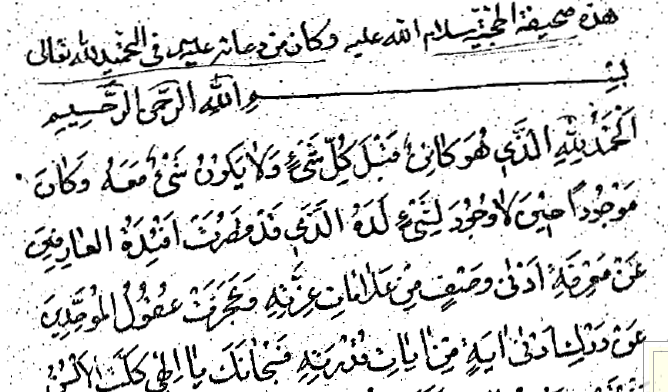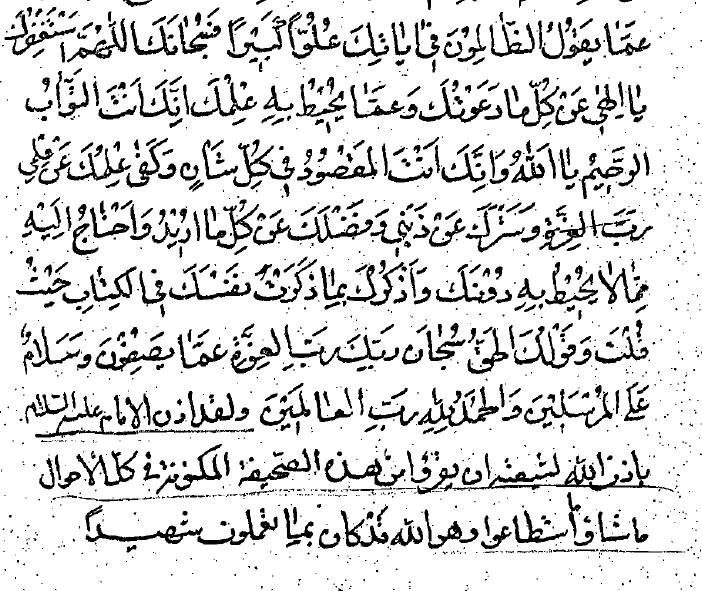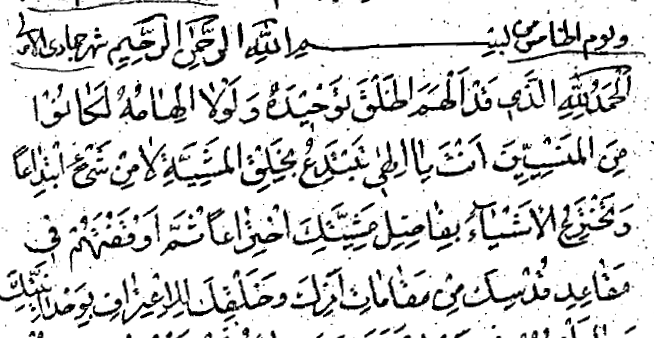Thou [God] have indeed ennobled me [qad akramtani = the Bab] at the very moment (ḥīn) of my [coming into earthly] existence (wujūdī) for Thou art the Most Glorifying (ajall), the Most Great (a`zam) among such as might be questioned” (A statement of the Bab towards the end of the Ṣaḥīfa al-Ḥujjatiyya, XIV [14] 499).
The Bab,
The Ṣaḥīfa al-Ḥujjatiyya
("The Treatise of the Messianic Proof"), c. 1260 AH/1844 CE
♦
Some Introductory Notes
Stephen Lambden UC Merced 2023.
Last revised 24-09-2023,
The Ṣaḥīfa al-Ḥujjatiyya or Ṣaḥīfa makhzūna ("The Treatise Treasured Away").
This roughly sixty page Arabic work has slso been known as the (Per.) Du`a-yi ṣaḥīfa, The Supplication(s) forming a Treatise and the Ṣaḥīfa makhzūna("The Treatise Treasured Away").
The title has been Persianized as the he Du`a-yi ṣaḥīfa, the Supplication(s) forming a Treatise as well as the Ṣaḥlfa-yi Ḥujjatiyya. It is also known as the Ṣaḥīfa makhzūna ("The Treatise Treasured Away") which may indicate its rarity, hiddenness or obscrurity.
Little research has been carried out on this very rare ms. save the important notes of the late Denis MacEoin (d. 2022) in his valuable Sources (see index within this book, e,g, ).
Extant manuscripts
- X
- X
- X
- X
Ṣaḥīfa al-Ḥujjatiyya - Opening and closing lines
I shall illustrate its opening and closing words from the Afnan relayed Ṣaḥīfa al-Ḥujjatiyya ms gifted to myself in the 21st cent.

"This is the Ṣaḥīfa al-Ḥujjatiyya ("The Treatise of the Messianic Proof") - may the peace of God be upon him - expressing [as part I] of His devotional Supplication (du`a) of Tamhid, the Praise or Laudation before God, Exalted be He!
In the Name of God, the Merciful, the Compassionate,
Praised be to God who Existed prior to All-Things (ka'in qabl kulli shay')! There was no single thing alongside Him. And He had existence (mawjud an) at that moment when there was no existence for anything nigh unto Him (la wujud li-shay' lada-hu). He hath yet ever been the One Who enraptures the inmost hearts of the mystic knowers (af'idat al-`arifin) away from any unbecoming gnosis (ma`rifat adni) ...
The final section XIV [14] of the Ṣaḥīfa al-Ḥujjatiyya ends as follows :

... So Glorified be Thee O my God! I beg Thy forgiveness O my God, for all that I have deigned to [inadequately] supplicate Thee or of whatsoever hath been preserved in this respect within [the repositiries] of Thy knowledge for Thou art indeed O my God, the All-Bountiful (al-Wahhab), the All-Merciful (al-rahmin). And Thou art assuredy the One Intended (al-maqsud) in every circumstance (fi kull sha'n) for
Dating of the Ṣaḥīfa al-Ḥujjatiyya ("The Treatise of the Messianic Proof")
In his Sources, Denis MacEoin writes:
"It is not clear when the Du`a-yi ṣahīfa was written, but the fact that it is included in the Kitāb al-fihrist immediately after the Qayyum alasma' makes it reasonable that it should be dated before the Ḥajj
journey. There appears to be a reference to it in the Qayyum alasma', where it is stated that it had been sent down along with that work so that the believers might know how to worship God. 66 That
it and the Ṣahīfa makhzūna are identical may be confirmed by a simple comparison of texts occurring under both titles.
This work is listed in the Kitab al-Fihrist (The Book of the Index) of the Bab which is dated to 15th Jumādā II 1261/21 June 1845. It is included or listed by the Bab next to, immediately after, the Qayyum al-asma' which was written from May 22nd 1844 and over the next forty days or perhaps somewhat longer. The Ṣaḥīfa al-Ḥujjatiyya is thus likely to date to 1260 or 1844 and stands among the earliest writings of the Bab. It opens with the standard Islamic basmala and contains several blessings upon the Prophet Muhammad- occasionally referred to as the khatam al-nabiyyin ("seal-acme-paragon of the prophets" (Q. 33:40b) - along with his purified (Ar.) al or "family".
The Fourteen section of the Du`a-yi ṣaḥīfa, Ṣaḥīfa makhzuna or Ṣaḥīfa al-Ḥujjatiyya
As MacEoin puts it, "This important early composition is a collection of fourteen prayers, mainly intended for recitation on specific days or festivals". I have slightly revused and extended his succinct listing of the 14 supplicatory sections:
I. On Tahmīd, the Laudation of God.

I. On Tahmīd, a theologically grounded expression of the praise or laudation of God - see the text and translation above. In the ms. I have dawn on here this Du`a section is about six pages long (pp. 436-441). Here the Bab celebrates God's existence before anything else, His pre-existebt singularity,
"This is the Ṣaḥīfa al-Ḥujjatiyya ("The Treatise of the Messianic Proof") - may the peace of God be upon him - expressing [as part I] of His devotional Supplication (du`a) of Tamhid, the Praise or Laudation before God, Exalted be He!
In the Name of God, the Merciful, the Compassionate,
Praised be to God who Existed prior to All-Things (ka'in qabl kulli shay')! There was no single thing alongside Him. And He had existence (mawjud an) at that moment when there was no existence for anything nigh unto Him (la wujud li-shay' lada-hu). He hath yet ever been the One Who enraptures the inmost hearts of the mystic knowers (af'idat al-`arifin) away from any unbecoming gnosis (ma`rifat adni) ...
_______
Ṣaḥīfa al-Ḥujjatiyya II:

[2] On the `ld al-Ghadlr [18 Dhū '1-Hijja];67 Fridays; 5 Jumāda I
II. On the 5th day of the month of Jumāda Awwal [I]
`ld al-Ghadlr [18 Dhū '1-Hijja]; Fridays; 5 Jumādā I
In the Name of God, the Merciful, the Compassionate,
[1] Praised be to God who hath inspired the Creation-Created things [ creatures] (al-khalq) by virtue of His Divine Unity (tawhid). [2] If it were not for His Power of Inspiration (ilham) such would indeed be numbered among the among those who forget [are wanting, deprived] (min al-nasiyyin). [3] Thou, O my God art the Wondrous Creator (mubda`) Who created the Divine Will (mashiyyat) from nothing (la min shay').
MacEoin describes this second section as "the day of the Bāb's announcement of his claims" though it
III. On the `ld al-Fitr [1 Shawwal]
IV. On the `ld al-Adha [10 Dhū 1-Hijja]
V. On Fridays
VI. On the day of cArafa [9 Dhū '1-Hijja]
7. On the cld al-Akbar [i.e., 9 Rabl' I] 68
8. On the day of'moistening' [8 Dhū '1-Hijja] 69
9. On each day of [the months of] Rajab, Shaman, and Ramadan
10. On the night of cĀshūrā [10 Muharram] and the third part of
every night
11. On the night of the 'declaration' and 5 Jumādā I
12. On the night of 15 Sha'ban [birth of the Imam Mahdl]
13. On the night of 23 Ramadan
14. On the completion of [reading] the Qufan
_________________________
65 Momen, Bābl and Bahā'ī Religions, pp. 89-90.
66. Qayyum al-asma', 41: 32. The Cambridge text refers to it as
tūka 'l-ıahtfa al-mataūba, possibly in error for maknuna as a variant
of makhzuna. The reference to dcfwāt (prayers) would seem to
confirm the identity.
67. This festival celebrates the Prophet's nomination of 'All as his
successor. It was instituted in Baghdad in 351/962, under the Būyid
ruler Mu'izz al-Dawla.
68. This date is not usually celebrated as a festival. It signifies the
first day of the imamate of the Hidden Imam, following the death of
his father. Hasan al-'Askart, on 8 RabI' I 260/873.
69 Yawm al-tarwiyya, the day following that on which pilgrims leave
Mecca during the hajj. It is given this name, it is said, because it is
on this day that the pilgrims supply themselves with water sufficient
for the next two days, spent on the plain of 'Arafat.
[60] EARLYWORKS
Several manuscripts of this work have survived, among them a small volume in Cambridge University Library (Add. 3704 [6]). This originally belonged to E.G. Browne, who bought it from J. J. Naaman's of London. It is not known where Naaman obtained it. In the Supplementary Handlist of Muhammadan Manuscripts in Cambridge, a description of this manuscript reads: 'A Bābl book of the earliest period, apparently by the Bāb, resembling the style of the Qayyumu'l-Asma', in which he speaks of himself as
Baqiyyatu'llah Sāhibu'z-Zamān.'
However, the opening passage of the Ṣaḥīfa — admittedly severely damaged in the Cambridge copy — reveals precisely the opposite, that the Bāb does not claim to be 'the Baqiyyatu'llah Sāhibu'z-Zamān' (i.e., the Hidden Imam), but rather 'his gate, the Remembrance (Bābini ' l-dhikr)'. 70
For details of manuscripts, see Appendix One. It will be noted that there are two very early copies, one dated 1261/1845 (Haifa), the other 1262/1846 (Tehran, INBA).
In a letter written by Hājj Mirza Muhammad Taql Afnān, a younger cousin of the Bāb, some general details are given of compositions in the period immediately before the latter's departure for Arabia towards the end of Shacban. 'On Sundays, I used to visit my aunt, the blessed mother of his holiness, and I would enter his blessed presence. In Rajab or Shacban, I visited him on a Sunday.... He was busy writing verses and prayers. He gave me a page containing a prayer, one of several he had revealed for the days of the week. He told me to read it. When I had done so, he asked, "What prayer is this?" I said, "It resembles the prayers in the Saķīfa-yi Sajjadiya" 71 . That week or the week after, he set off for
Mecca.' 72
70. The passage in question reads: 'This mighty and hidden book has been sent down by God, praised be he, to his servant Muhammad ibn al-Hasan [i.e., the Hidden Imam], upon him and his father be peace. And the Remnant of God [baqiyyat Allah], the Lord of the Age [sahib al-zamān] has [in turn] sent it to his gate, the Remembrance [al-Dhikr — one of the Bāb's titles] that it may be God's proof for all men....'
71 A well-known collection of prayers ascribed to the fourth Imam.
72. Faydl, Khandan-i Afnān, p. 111. A reproduction of the original letter is inset



